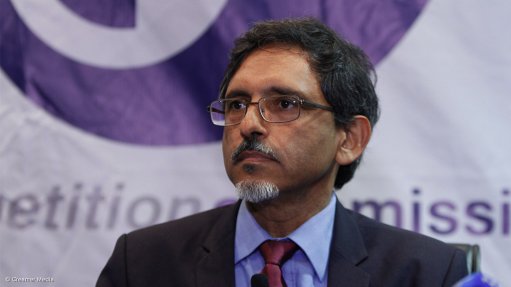
Economic Development Minister Ebrahim Patel
Photo by: Duane Daws
Economic Development Minister Ebrahim Patel has established an advisory panel to develop draft amendments to the Competition Act with a view to bolstering South Africa’s legislative capacity to address “persistently high levels of economic concentration”.
Patel announced the proposed amendments in his Budget Vote speech, indicating that the changes could compel the competition authorities to consider the ownership profile, as well as structural impediments to market entry, when assessing mergers or complaints of anti-competitive conduct.
The panel, which is expected to report to the Ministry within six weeks, is made up of advocate Michelle le Roux of the Johannesburg Bar, Doris Tshepe, a partner in a Johannesburg law firm, Liberty Mncube, the Competition Commission’s chief economist and Professor Imraan Valodia, dean of the Faculty of Commerce, Law and Management at the University of the Witwatersrand.
Patel said the current Act was primarily concerned with anti-competitive effects arising from the conduct of market participants, as opposed to optimising the structure of markets.
“It is therefore proposed to amend the Competition Act to enable more effective measures to be taken against these features of market structure. These amendments will amplify and complement the measures already available to address all forms of anti-competitive conduct.”
He argued that, remedying “economically unjustified” concentration could have both social and economic benefits.
Economically, the easing of impediments to competition could facilitate new market entrants into certain sectors, which would enhance consumer choice and bolster innovation. Socially, such legislation could open markets to greater participation by historically disadvantaged South Africans.
“Markets plagued by over-concentration and untransformed ownership will be identified, investigated and appropriate measures applied to remedy these market features. These inquiries, and any remedies that result, will target the primary structural impediments to market entry and ownership by black South Africans,” Patel explained in an explanatory note released together with his Budget Vote.
The note added that the proposed amendments would further the objectives of competition policy and bolster the remedial tools available to the competition authorities to ensure the Act’s objectives were met.
While these proposed amendments were subjected to public-consultation and legislative processes, the competition authorities would continue with their efforts to deal with anti-competitive behaviour.
Patel reported that the Competition Commission would investigate about 100 cases of cartel behaviour in different sectors of the economy, including food, infrastructure, chemicals, financial services and automotive parts. It would also conduct a market inquiry into high data costs.
“To improve resources for the competition authorities, we will Gazette an adjustment to the filing fees for mergers.”